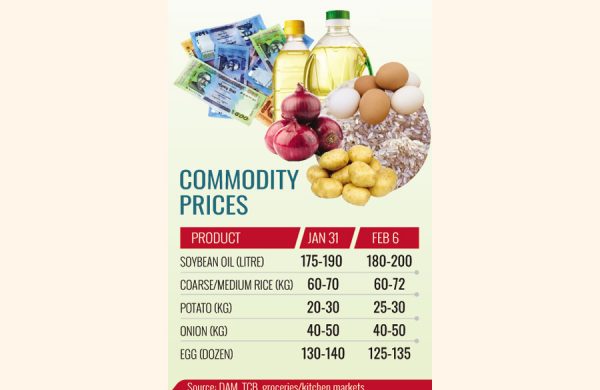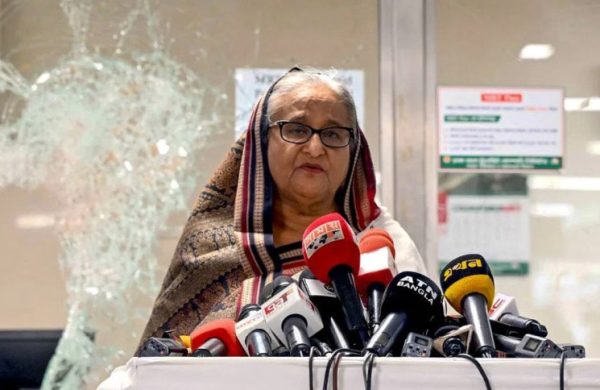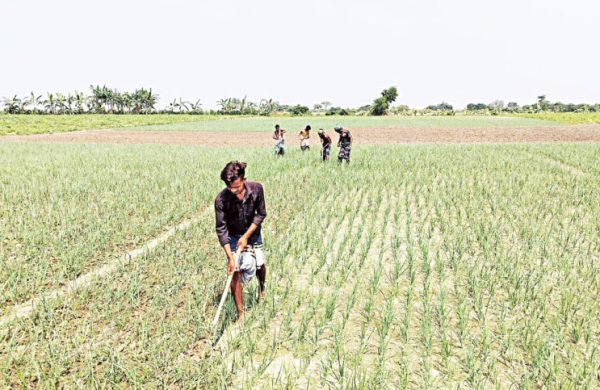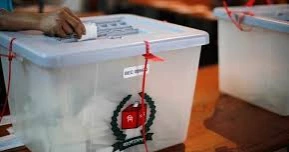Edible oil prices skyrocket again amid supply crunch
- Update Time : Friday, February 7, 2025

Rice market still volatile
TDS Desk:
The edible-oil market became volatile again last week as most refiners squeezed supply to groceries.
Many distributors allegedly sold stored oil at higher rates. On the other hand, some grocers were found selling copycat products at Tk 190-210 a litre against the official price of Tk 175 per litre, according to kitchen market sources.
Apart from soybean oil, palm oil prices also shot up by Tk 10-15 a litre, with loose oil vendors in Dhaka’s kitchen markets selling it at Tk 175-185 per litre.
Meanwhile, the rice market volatility continues as coarse and medium rice is being sold at Tk 60-72 a kg. Coarse rice is selling for Tk 60-62 a kg and the medium variety at Tk 68-72 a kg, marking a Tk 2.0 per kg hike.
However, fine rice prices remained static, selling for Tk 85-98 a kg. The prices of potato, onion, vegetables, and egg also remained the same, giving consumers some relief.
Refiners previously fixed bottled soybean oil prices at Tk 175 a litre following a consensus with the government on December 16 last year.
This represented a Tk 8.0 a litre increase. Besides, both loose soybean oil and the best-quality palm oil were priced at Tk 170 a litre.
Visiting groceries in several areas of the city, this correspondent found consumers were able to purchase bottled soybean oil at Tk 175-180 a litre from very few shops on Thursday.
A grocer at the Segunbagicha kitchen market told that he had ordered five cartons of oil, each containing 18 bottles, but received only two cartons three days back.
“I only have five one-litre soybean oil bottles left in my store. How can I do business without supply?” he said.
Other groceries at the market hardly had one-litre bottles.
Meanwhile, groceries in Mohammadpur and West Dhanmondi were almost out of one-, two-, and five-litre bottles. A few shops had five-litre bottles priced at Tk 900 against the official rate of Tk 875.
Belal Hossain, a grocer at West Dhanmondi, said distributors are not supplying oil.
Supply squeezed ahead of Shab-e-Barat and grocers are making budgets to buy products for Ramadan, he said.
He claimed many distributors are selling oil at Tk 185-190 a litre from five-litre bottles.
Many groceries in Hazaribagh, Mohammadpur, Sankar, Rayerbazar, Farmgate, and other areas were selling one-litre bottles of unknown companies at Tk 190-200 a litre.
According to grocers, the supply of products of major brands, such as Rupchanda (Bangladesh Edible Oil), Bashundhara, and Fresh, almost stopped over the past few weeks.
Two to three other companies were supplying oil, which is not enough to meet the demand, they said.
On January 6 this year, the Bangladesh Vegetable Oil Refiners and Vanaspati Manufacturers Association sent a letter to the commerce ministry, requesting a price review in light of the global market trends and rising import costs.
The request was reiterated in another letter on January 15, confirmed a ministry official.
To reduce the financial burden on consumers, the government had earlier withdrawn import duties and VAT on soybean oil, bringing the cost down by Tk 8.0-10 per litre.
However, with the rising dollar exchange rate, the government revised up the price to Tk 175 per litre, which refiners accepted.
Before this adjustment, the National Board of Revenue (NBR) had announced major tax exemptions on December 16 last year, including the removal of import duties, regulatory duties, and advance income tax on both refined and non-refined edible oil, such as sunflower, canola, soybean, and palm oil.
The exemptions are effective until March this year.
Additionally, VAT on edible oil for final consumers was waived, and that on imported edible oil was reduced to 5.0 per cent from 15 per cent.
These steps, based on recommendations from the Bangladesh Trade and Tariff Commission (BTTC), aimed to stabilise the market and ease consumer burden, according to NBR officials.
City Group Director Biswajit Saha earlier told that his company is supplying oil to distributors in time.
“We are sending information on our supply regularly to BTTC, National Security Intelligence, and Directorate of National Consumers’ Right Protection,” he said.
Iqbal Bahar Sabery, secretary of the Consumers Association of Bangladesh’s Chattogram division unit, criticised refiners for employing what he called “ransom tactics” to press home their demands.
He accused refiners of exploiting their market dominance, made possible by a value chain controlled by merely six to seven companies.
“In the early 2000s, there were 250-300 edible oil importers in Chattogram and Dhaka. Over the last 16 years, that number dwindled to just a few,” he said.
Sabery urged the interim government to take strong action against oligopoly and implement an import policy that boosts a competitive market environment.
He also called for strict market monitoring to give consumers some relief. “It should be done immediately, ahead of the fasting month.”
Bangladesh needs 2.2-2.5 million tonnes of edible oil annually. 95 per cent of the demand is met through imports.














